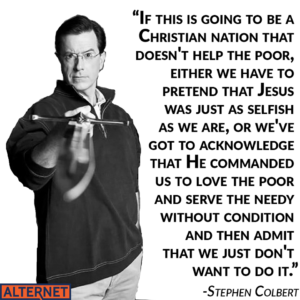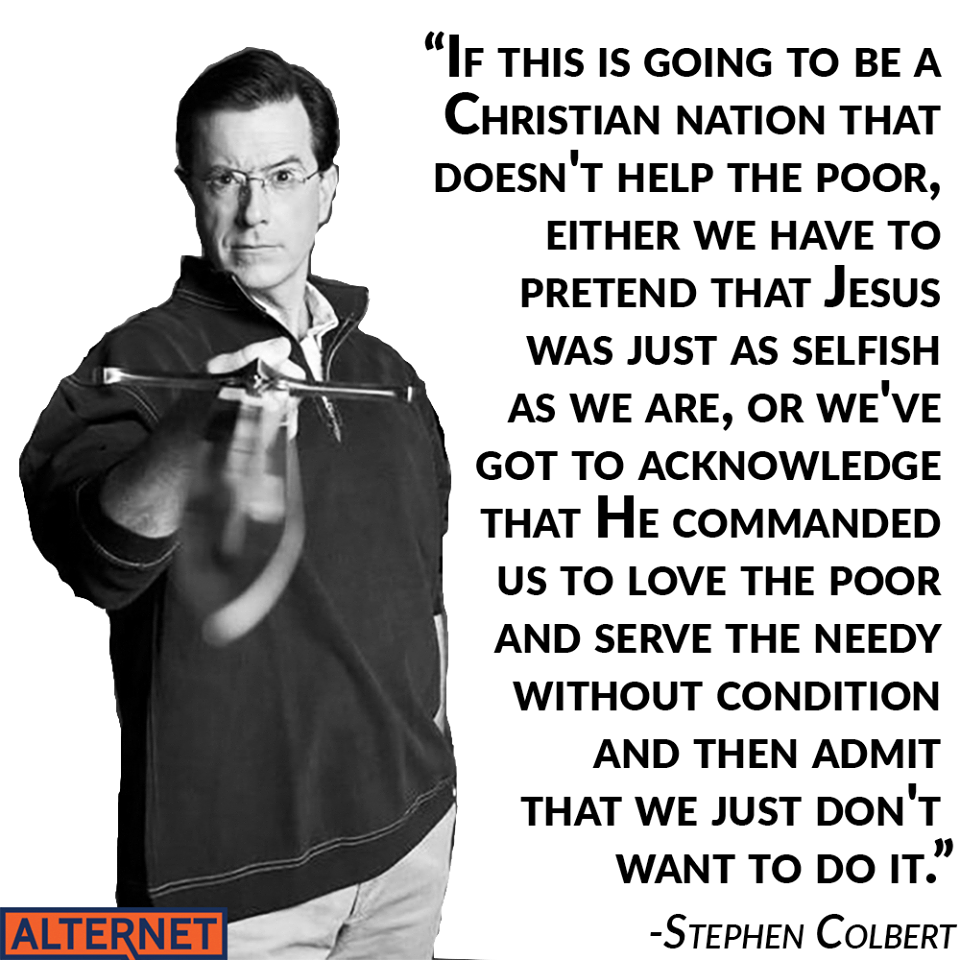By Jeremy Reynalds, Ph.D.
Founder and CEO
Joy Junction Inc.
 God uses those we don’t like or agree with.
God uses those we don’t like or agree with.
Those words were part of Calvary of Albuquerque Pastor Skip Heitzig’s message one Sunday.
They reminded me of this meme which I posted on Facebook recently. The words that spoke to me were those that reminded us of our obligation to love the poor and serve the needy unconditionally.
I really didn’t have the current controversial situation in mind about whether or not to accept Syrian refugees when I posted Colbert’s comments on Facebook with this question, “True, not true, or a simplification of what Jesus really meant? What do you think?”
However, the refugee situation and Colbert’s opinions were very much on the mind of many of those commenting.
The first person to respond commented, “I’m getting very tired of being lectured and berated by some to do my ‘Christian duty’ in regards to the Syrian refugees.”
Another individual commented, “Jesus respects the sovereignty of a nation. We are justified in not allowing refugees and or terrorists in.”
Someone else said, “Thank you for posting, in discussing it with others I reminded myself of some principles that had grown distant in my mind. I was against the refugees coming to the USA yesterday but in considering some of those principles I think it could be a great opportunity to show the world that we are indeed a Christian nation.”
However, another person said she found it interesting that people automatically chose to apply Colbert’s words to the refugee situation and not to America’s homeless population!
She continued, “Absolutely no one can argue that point! We, as in fellow Christians; we as in churches – we as in the U.S. government have NOT been taking care of our homeless! End of story. No argument necessary.”
Well, have we or not? It’s worth a thought, even if it takes someone like Colbert whose verbiage is apparently anathema to many conservatives, to make us think.
According to the United States Interagency Council on Homelessness , in his 2016 budget the President calls for nearly $5.5 billion in targeted homelessness assistance. That’s a lot of money.
While it’s hard to estimate the dollar amount spent by private charities on the homeless, it’s a vast amount and a lot of help. To name just a few, there’s Catholic Charities the 300 members of the Association of Gospel Rescue Missions and the Salvation Army which operates 7,546 centers in communities across the United States.
All that help isn’t apparently reducing the number of homeless as quickly as some rosy proclamations throughout the past couple of decades or so had originally hoped.
A recent report from the Department of Housing and Urban Development said there are still more than 500,000 people homeless in the U.S.
So it seems that the government and Christian ministries are expending a huge amount of money and energy to help the homeless and hungry.
Does that render Colbert’s rhetoric invalid? I don’t think so. Just because we don’t agree with him and the New York Post says his show has become “Propaganda for Democrats” doesn’t mean as one person wrote on Facebook that we can’t “take Jesus lessons from Stephen Colbert.”
Verbiage like this is still readily available on the Internet.
In his book “In the Shadow of Plenty,” author George Grant wrote “There is a clear distinction then between the oppressed and the sluggardly. The oppressed would work only if they could. The sluggardly could work, if only they would.”
Grant continues by saying that subsidizing sluggards is the same as subsidizing evil. While the book is almost 30 years old, this sort of thinking continues in books like Robert Lupton’s 2012 “Toxic Charity.”
One reviewer of his book writes, “Lupton moves uncritically between uplifting the capacity and creativity of the poor and degrading them as lazy and dishonest. ‘Most (panhandlers) are scammers,’ he states (45). Most poor people in the United States ‘assume that their subsistence is guaranteed’ and so lack any kind of work ethic, he claims.” (121).
So while Colbert’s claim in this meme is exaggerated and over simplified, with some Christians holding to the philosophy espoused by Grant and Lupton, is it any wonder that he thinks as he does?
What’s the answer? We all need to start talking to each other and stop communicating past people with whom we disagree. As a professor at Biola University where I obtained my Ph.D. was fond of saying, “There’s always a little truth even in the worst untruth.”
Perhaps in some unconventional way, Colbert may be a messenger from God if he causes us to start communicating with people to whom we don’t normally talk. What have we got to lose?


